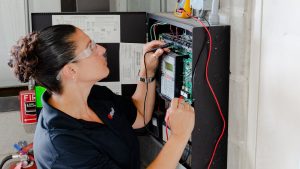
Preventive maintenance saves money on fire protection by minimizing the risk of severe damage or critical failures.
When it comes to protecting lives and property, fire protection systems are non-negotiable. From sprinklers and alarms to suppression systems and extinguishers, these tools are the first line of defense against devastating fires. But too often, businesses only think about these systems when something goes wrong. The reality is simple: preventive maintenance saves money on fire protection systems while ensuring they’re always ready to perform in an emergency.
Why Preventive Maintenance Matters
Fire protection systems are complex, combining mechanical, electrical, and electronic components that must work flawlessly together. Over time, normal wear and tear, dust buildup, corrosion, or undetected malfunctions can compromise their effectiveness. Preventive maintenance keeps small problems from turning into costly failures. More importantly, it ensures compliance with fire safety codes and standards, which can protect you from fines and liability.
How Preventive Maintenance Saves Money on Fire Protection Systems
Avoids Emergency Repairs
Emergency breakdowns often require immediate response, parts, and labor at premium costs. Scheduled preventive maintenance helps identify issues early, minimizing unexpected failures and expensive urgent repairs.
Extends Equipment Lifespan
Just like vehicles, fire protection systems last longer when properly maintained. Regular inspections, testing, and cleaning prevent premature wear, saving money on early replacements and upgrades.
Reduces Insurance Premiums
Many insurers reward businesses that demonstrate proactive fire safety. Showing proof of regular inspections and maintenance can help lower insurance costs while reducing the financial impact of fire-related claims.
Minimizes Business Downtime
A malfunctioning fire alarm or sprinkler system can force you to halt operations until the issue is fixed. Preventive maintenance keeps systems reliable, avoiding downtime that can cost thousands in lost productivity.
Ensures Code Compliance and Avoids Fines
Regulatory bodies like NFPA (National Fire Protection Association) require routine inspection and testing of fire protection systems. Failure to comply can lead to penalties or legal action. Preventive maintenance ensures compliance, saving you money on fines and protecting your reputation.
Protects Against Catastrophic Losses
A properly maintained fire protection system detects, suppresses, and contains fires quickly. This prevents devastating losses to property, inventory, and equipment—far outweighing the cost of routine maintenance.
Long-Term Value of Preventive Maintenance
When you look at the big picture, preventive maintenance is an investment rather than an expense. For a fraction of the cost of major repairs or fire-related damages, you gain peace of mind knowing your systems are dependable and fully compliant. Whether you manage a warehouse, office building, healthcare facility, or retail space, making preventive maintenance a priority is a proven way to reduce risks and save money.
Fire Protection Services from Fireline
Whether you need smoke detectors, fire extinguishers, or an automatic sprinkler system installed at your commercial property, Fireline has you covered. We have been protecting people and property from fire damage since 1947—and our experience shows in our excellent work! We are known for our superb customer service, our expertise, and our reliability. For more information on how we can help your residential or commercial property, visit us online or give us a call at (800) 553-3405. We are in Baltimore, MD, with a second office in Leesburg, VA. For more fire safety tips, be sure to follow us on Facebook, Twitter, and LinkedIn.
